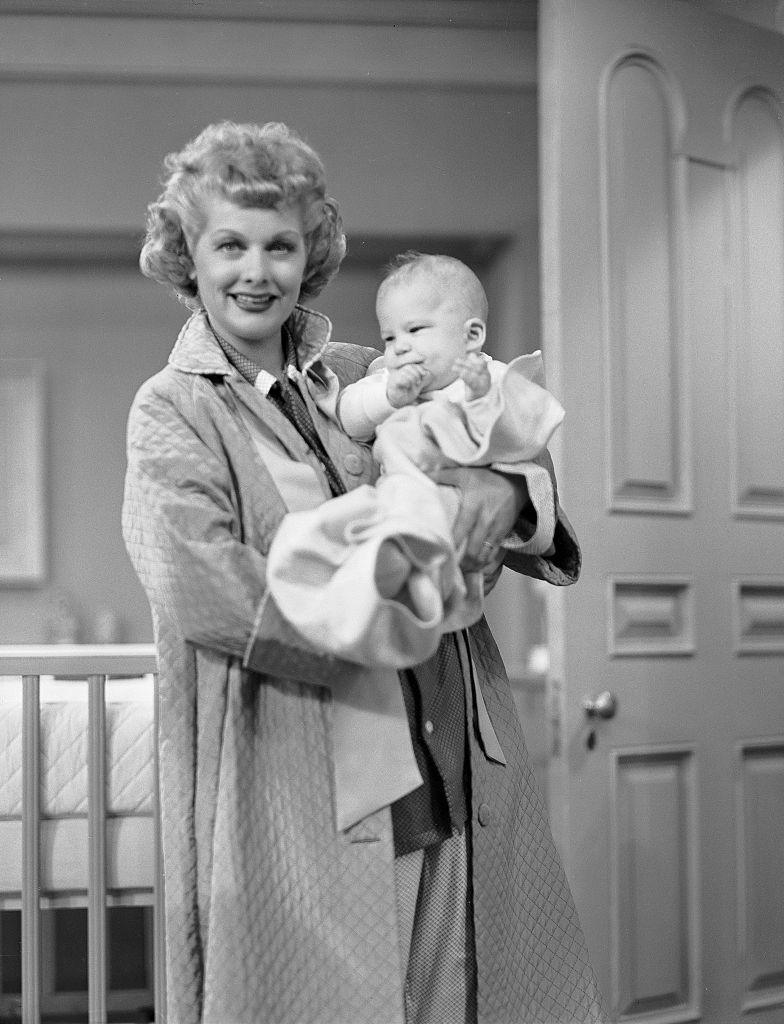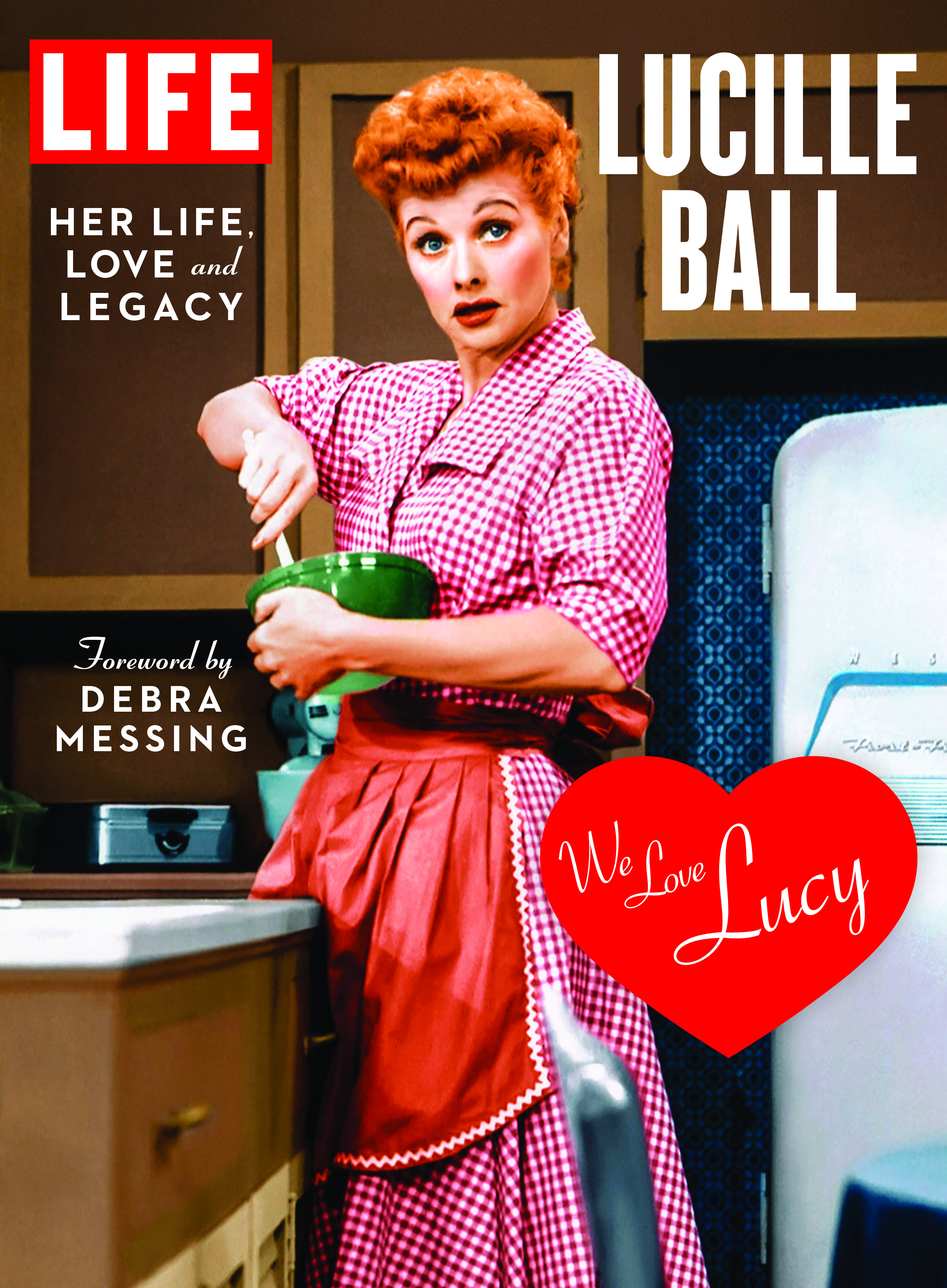
On the surface Lucy Ricardo didn’t fit the societal norms of the day. As Betty Friedan wrote in her 1963 classic The Feminine Mystique, “The American housewife . . . was healthy, beautiful, educated, concerned only about her husband, her children, her home.” Happy homemakers could be found on every network, from the patient mom Margaret Anderson of Father Knows Best to the profoundly agreeable June Cleaver of Leave It to Beaver. Instead, on I Love Lucy, Lucy was a hot mess. There was something comforting, even liberating, about her inability to control her urges. She and Ricky became America’s favorite TV husband and wife.
Starting from the first season, Lucy performed a wide range of routines that effortlessly balanced comedy with sentiment and questioned the roles of men and women. “There is no doubt that Lucille Ball created a whole new audience for watching television,” said actress Carol Burnett. “She took you on some kind of a wild journey over those 22 minutes, and you could not wait to see what else she was going to cook up.” Americans tuned in in droves. Within six months, the audience reached 11 million, with I Love Lucy attracting 67 of every 100 nine o’clock Monday night viewers. That year I Love Lucy was nominated for an Emmy award for Best Comedy Show, and on May 26, 1952, Lucy graced the cover of TIME, with the headline, “Lucille Ball, Rx for TV: A Clown with Glamour.”
Read more: 100 Women of the Year—Lucille Ball
More from TIME
At the time, Lucy was pregnant again. The Code of Practices for Television Broadcasters prohibited anything sexually suggestive on the air, and that included even the discussion of pregnancy, since it implied that a couple, even a married one, had engaged in baby making. When told that his wife’s swollen belly could affect the program’s future, an incredulous Desi demanded, “What is so wrong if she has a baby in the show as Lucy Ricardo?” Executives suggested that Lucy could hide the pregnancy by sitting behind chairs or tables. “Not Lucy,” he responded. Still, most of the people who worked on the show feared the program would be canceled.
Eager to find a solution, Desi and writer Jess Oppenheimer discussed Lucy’s pregnancy with CBS and sponsor Philip Morris. With their approval, the producers decided to do something that had never been done before: incorporate the pregnancy into the script. Since the word “pregnancy” itself was not allowed on TV, they resorted to phrases like “expecting” and “with child,” and sought the blessings of a priest, a minister, and a rabbi who were given the script to read. “They didn’t change a word,” said writer Madelyn Pugh.
Get your history fix in one place: sign up for the weekly TIME History newsletter
Lucy’s due date was in January. On Dec. 8, Lucy’s character breaks the news to Ricky in an episode titled “Lucy Is Enceinte,” using the French word for pregnant. Ricky is so busy with work that Lucy struggles to win his attention. Finally, she heads to his nightclub. While Ricky is performing, he is handed a note from an anonymous audience member who wants to tell her husband that they are going to “have a blessed event.”
As Ricky walks around the club singing “Rock-a-bye Baby,” he asks several couples if they are the lucky pair, but each one says no. He then notices Lucy seated at a table. “Hiya, honey,” he says, yet doesn’t notice that his glowing wife is nodding her head yes. Suddenly he catches on, kneels before her and tearfully announces, “It’s me. I’m going to be a father. How about that,” as he gazes into Lucy’s eyes. “The audience was in tears,” recalled director William Asher. “It was terribly emotional.”
Lucy scheduled a caesarean delivery for Monday, Jan. 19, 1953, and CBS readied the birth episode for broadcast that evening. Whether Lucille Ball had a boy or a girl, on I Love Lucy the baby was to be a boy. An unprecedented 44 million Americans gathering before three quarters of the nation’s TV sets tuned in to watch “Lucy Goes to the Hospital,” during which Ricky, Ethel, and Fred’s best-laid plans for getting her there dissolve into a beautifully choreographed slapstick sketch that echoed the antics of the Keystone Cops decades earlier.
Comedienne Edie Adams, who was performing in the hit Broadway musical Wonderful Town, recalled watching the episode backstage in New York. “We had a television set in the back for when Lucy had the baby. And the entire evening everybody was running back [asking] ‘Is it there? Is it?’” she said.
The birth of Desiderio Alberto Arnaz IV, known as Desi Jr. (and Little Ricky on TV, played initially by James John Ganzer and then by several sets of twins and young actors over the years), made headlines. “TV Actress Lucille Ball Gives Birth to Son, Exactly According to Script,” announced the International News Service. The following month, new mom Lucy won an Emmy for Best Comedienne, and Desi and Oppenheimer took home statuettes for Best Situation Comedy.
Desilu Productions was on a roll. As the studio’s output expanded, it became clear the production facility would need more space. The company bought a seven-acre lot on Cahuenga Boulevard and built nine soundstages, along with offices. From the new facility, the company turned out shows like Our Miss Brooks with Eve Arden and the pilot of Danny Thomas’s Make Room for Daddy. That year, LIFE featured Lucy, Desi, Lucie, and Desi Jr. on its April 6 cover, proclaiming them “TV’s First Family.”

This piece is adapted from LIFE’s special edition Lucille Ball: Her Life, Love and Legacy.
More Must-Reads from TIME
- Cybersecurity Experts Are Sounding the Alarm on DOGE
- Meet the 2025 Women of the Year
- The Harsh Truth About Disability Inclusion
- Why Do More Young Adults Have Cancer?
- Colman Domingo Leads With Radical Love
- How to Get Better at Doing Things Alone
- Michelle Zauner Stares Down the Darkness
Contact us at letters@time.com